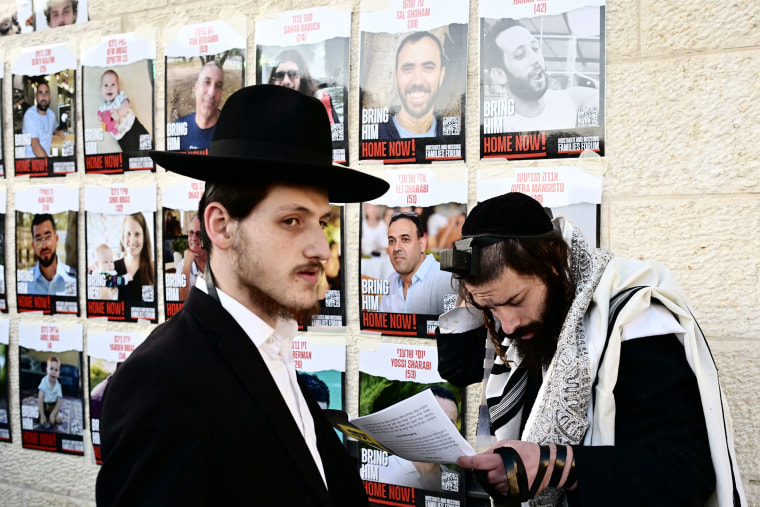TEL AVIV — Israel's Supreme Court on Thursday ordered an end to state funding for ultra-Orthodox yeshiva students who do not serve in the army, a blockbuster ruling that could imperil the leadership of Prime Minister Benjamin Netanyahu as he wages war with Hamas in Gaza and clashes with key ally the United States.
The government faces a separate Monday deadline to come up with a new military conscription plan, as the war stirs mainstream public anger over exemptions for the ultra-Orthodox — a longstanding point of tension that could now bring political upheaval.
The court has placed new pressure on Netanyahu, whose fragile governing coalition partly relies on two ultra-Orthodox parties that have demanded the exemptions remain in place. A collapse of Netanyahu’s government would thrust Israel into new elections, which polls suggest he would likely lose.
Netanyahu's War Cabinet, meanwhile, features centrist former military generals who have given voice to mounting frustrations among the Jewish Israeli public over the fact that the ultra-Orthodox have been exempt from service even in the midst of the Israel-Hamas war.
Most Jewish men in Israel are required to serve nearly three years in the military, along with years of reserve duty, while Jewish women must serve two mandatory years. But for decades, exemptions have existed for the ultra-Orthodox, who make up about 13% of Israeli society, to allow them to study full time in religious seminaries.
The Supreme Court previously ruled that the exemptions are discriminatory and gave the Israeli government until Monday to present a new plan that addresses those concerns, and until June 30 to pass it.
Netanyahu’s attorney-general, Gali Baharav-Miara, wrote in a submission to the court that she did not see any legal basis for not moving forward with ultra-Orthodox conscriptions come Monday.
On Thursday, Netanyahu asked the court for a 30-day extension to establish a new plan, but the court did not appear to immediately respond to his request.
The top court separately issued its interim order blocking the government from funding monthly subsidies for yeshiva students who are between the ages of 18 and 26 and have not received a deferral from the military in the past year. It said the funds were to be frozen starting April 1.
The ruling will affect about a third of the roughly 180,000 seminary students who receive subsidies from the government for full-time studies, according to Israel’s Channel 12 TV station, which said the subsidies could be temporarily covered by the governing coalition’s discretionary funds.
The centrist members of Netanyahu's war Cabinet, both former military generals, have called on all factions of Israeli society to contribute to the country's war effort.
Netanyahu's chief political rival, Benny Gantz, on Thursday welcomed the Supreme Court's decision on yeshiva funding, writing in a post on X that it was the "obvious" decision, prioritizing Israel's “need for soldiers in times of severe war, and our society’s need for everyone to participate in the right to serve the country.”
“The time has come for the government to do the obvious,” he said. “It’s time for action.”
More than 32,000 people have been killed in Israel's offensive in Gaza, which was launched after Hamas' Oct. 7 attacks, in which around 1,200 people were killed and some 260 were taken hostage.
Tensions over exemptions from mandatory service for the ultra-Orthodox have only grown in the midst of the deadly war, in which more than 500 Israeli soldiers have also been killed.
The ultra-Orthodox have said mandatory conscription would threaten their way of life and commitment to upholding the Jewish commandments they say protect Israel as much as its military.
Aryeh Deri, head of the ultra-Orthodox Shas party, called the court’s decision “unprecedented bullying of Torah students in the Jewish state.”
Dr. Aharon Eitan, a researcher at the Jerusalem Institute for Policy Research focusing on the ultra-Orthodox who is also a certified rabbi and graduate of ultra-Orthodox Yeshivot, has a different view.
About two decades ago, he decided to enlist in the Israeli military as a combat soldier — and he said he believed that "even if you're studying the Torah, I think that you still have to take part."
"This is not the typical Haredi approach which I’m sharing with you," he told NBC News in a phone interview Thursday night. "But there are Haredi who are advocating for such a position."
Eitan said he believed that "the fact that you're studying the Torah doesn't mean you're exempt from paying your dues, sharing defending the country — especially after Oct. 7."
A poll conducted by the Israel Democracy Institute in March found that most Israelis want to see changes made to the exemptions given to the Haredi community.
Among Jewish Israeli respondents, a large majority (70%) said they think changes should be made to the exemptions given to the Haredim. Among Haredi, only 19% agreed, with 34% of Arab Israelis sharing the same view.

